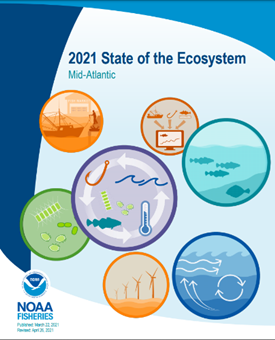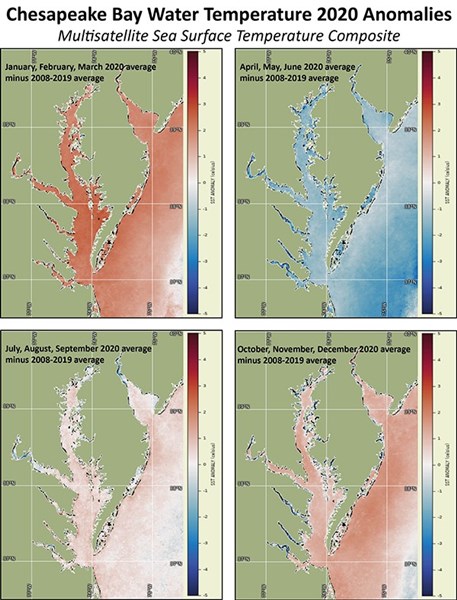Ron Vogel Commended for Work on the New Mid-Atlantic State of the Ecosystem Report
May 11, 2021 01:49 PM

2021 State of Ecosystem - Mid-Atlantic Report
© NOAA Northeast Fisheries Science Center
CISESS scientist Ron Vogel, Operations Manager for the East Coast Node, was recently recognized and highly praised for his contributions to the NOAA Chesapeake Bay Office to identify satellite derived products that support habitat and fisheries management applications. Vogel collaborated with NCBO’s Ecosystem Science Team by providing analysis of Bay water temperature anomalies which were used to identify interannual changes in seasonal water temps that impact blue crabs, oysters, striped bass and other ecologically and commercially important species.
He contributed to the Mid AtlanticState of the Ecosystem Report, part of the NOAA IEA program and a report used by the Mid Atlantic Fishery Management Council to implement their ecosystem approaches to fishery management plan. to the NOAA Northeast Fisheries Science Center's (NEFSC) 2021 State of Ecosystem - Mid-Atlantic Report with seasonal anomalies of satellite sea surface temperature (see Figure). Vogel's new operational product identifies interannual changes in seasonal water temperatures that impact blue crabs, oysters, striped bass and other ecologically and commercially important species. By combining environmental data from satellites with biological data on fish population, the report furthers the NOAA Fisheries Service goal of basing fishery management on ecosystem science (known as Ecosystem Based Fishery Management). The report is used by the Mid-Atlantic Fisheries Management Council to implement ecosystem approaches to U.S. fishery management planning. The full report is available at https://apps-nefsc.fisheries.noaa.gov/rcb/publications/soe/SOE_MAFMC_2021_Final-revised.pdf.

Figure: Satellite SST seasonal anomalies show warmer than average water temperatures from January through March 2020, cooler than average from April through June, near average July through September, and slightly warmer than average October through December.
Ron has also applied novel uses of satellite total suspended matter (TSM; such as sediment) values to evaluate the effects of large, tributary scale oyster restoration. This approach helped to assess the ecosystem services provided by the world's largest oyster restoration occurring in the Chesapeake Bay and is being submitted as a NOAA tech memo.
« Back